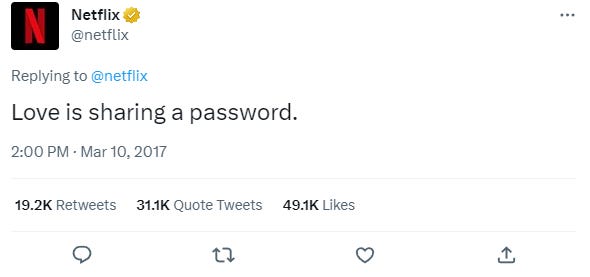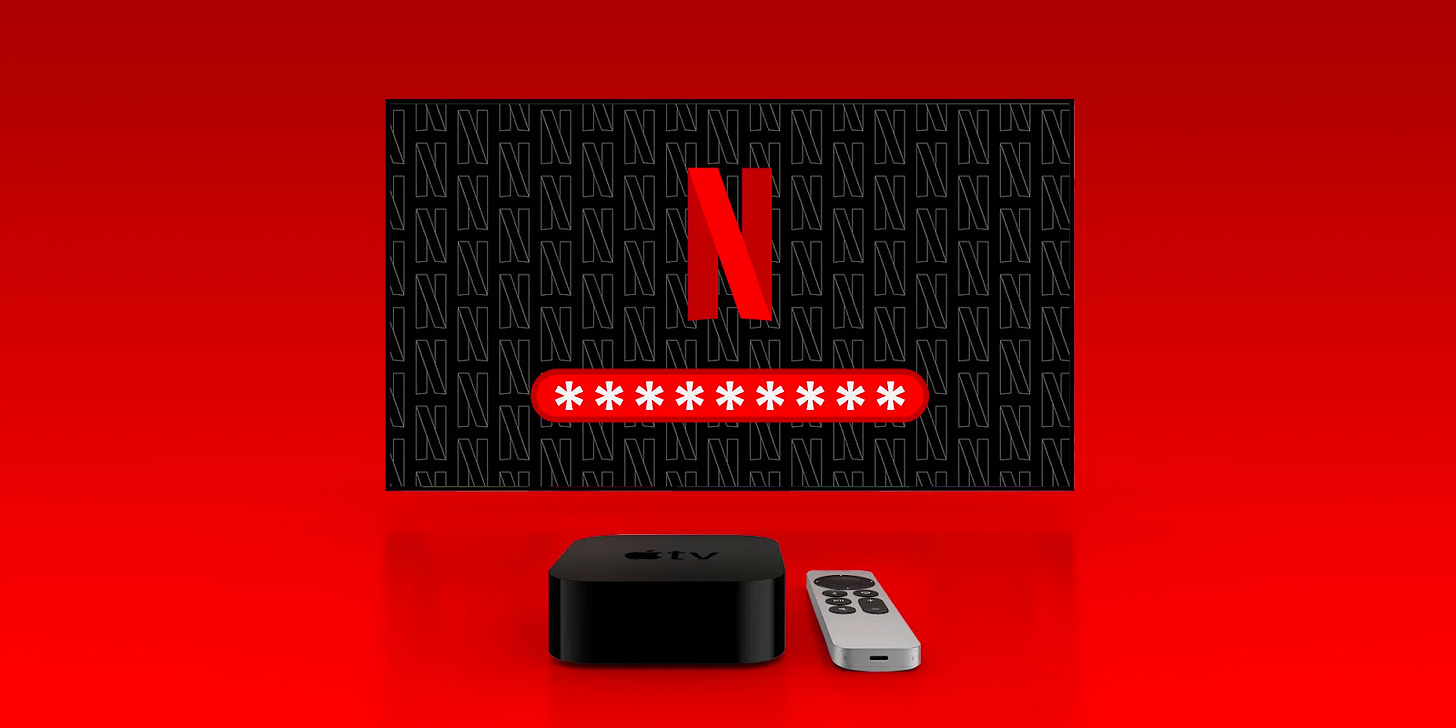On Netflix (NFLX), it is an extremely common practice to share passwords with friends and family. While violating terms of service, in the past it was nearly impossible to enforce. NFLX did attempt to curb this practice slightly by limiting profiles and the number of screens that can be used under one account simultaneously. While this didn’t entirely stop the issue, most generally liked the policy. You could split the cost with friends, and NFLX wasn’t losing massive amounts since by capping screens, password-sharing would sort of just be getting the full account value. In fact, NFLX has even joked in the past about password sharing.
The new policy
In a recent update, NFLX has confirmed changes to how password-sharing and Netflix accounts in general will be handled. These changes go from minor annoyances, to potentially losing NFLX hundreds of millions.
No sharing Netflix accounts
Under the new policy, Netflix accounts will be strictly locked to a single address. This is by far the largest change made in the update, and measures NFLX uses to enforce this policy are almost guaranteed to cause headaches for users. Tools used by NFLX include:
Setting an account “Home”
Every user must set an address to be the home for the account. Even with an account, users will be unable to log into Netflix if they are not at the set “home.” It is also possible that the use of Netflix will be barred entirely outside of the “home.” Users must also re-confirm the “homes” location approximately every 30 days, with failure to do so resulting in loss of access to the account
More aggressive tracking
This includes IP tracking, as well as other forms of tracking that warrant privacy concerns. If the IP doesn’t match the “home” set by the user, access to Netflix may be barred
Traveling with Netflix is significantly more difficult than it used to be
In the past, using Netflix outside of your own home wouldn’t be different from inside it. However, with the new policy, Netflix users can only use their accounts for 7 days away from their homes before access to their accounts will be barred.
Netflix rates have been raised
Netflix rates have been raised across the board, with plans being increased in cost by approximately $1. This measure has likely taken place with NFLX preparing for some subscriber losses
NFLX isn’t under obligation to keep policies consistent, so it should be noted that these changes are still up in the air, and especially changes like rate hikes aren’t fixed.
How does this hurt NFLX?
At first glance, these changes might appear to benefit NFLX greatly. After all, banning password-sharing would force more users to make their own accounts, widening NFLX’s bottom line. NFLX actually predicts that over 100 million accounts are illegally sharing passwords, so with this new policy, NFLX's profits could almost double (NTFX’s user base is approximately 200 million accounts).
However, cracks start appearing in the crackdown when you consider this: Netflix is a discretionary product. Unlike running water or heating, the $15 a month on Netflix is purely disposable income. You don’t need Netflix, you want Netflix. The affected subscriber base under this new policy didn’t want Netflix enough to buy their own account before, so why would they now? Additionally, many account holders don’t just share the password, they also share the cost. As much as half of the Netflix user base may go from paying less than half the total cost to full price in addition to new hikes. The Covid era gave rise to streaming platforms, and while it did help boost Netflix, it also broke the near-monopoly it held over the streaming platform industry. Because of this, streaming platform customers now have significantly more options. Platforms like Disney+ have comparable prices, and with the Disney bundle, you gain access to Disney+, Hulu, and ESPN for around the same price as Netflix. While illegal, most other streaming platforms don’t have the same systems in place to prevent password sharing as Netflix, so consumers used to sharing platforms are reasonably likely to just switch platforms altogether.
One thing to consider with all of these new platforms is that when their parent companies launched the services, they would generally take all of their content with them. For example, with the launch of Peacock, Netflix lost its rights to The Office. Another example is when Disney consolidated exclusive rights to most of their content to prepare for Disney+. As a result, most content on Netflix isn’t exclusive to the platform, and Netflix “Originals” are really the most defining assets of the platform since they are the only content that is exclusive to Netflix. To give credit to NFLX, some Netflix Originals are extremely popular, such as Stranger Things, or Wednesday. That being said, the good original content on Netflix is dwarfed compared to original content on competitors such as Disney+, which boasts the entire Disney Franchise.
Piracy
With this new policy, users may choose to pirate content instead of making their own account. Content pirating is extremely easy in today’s digital world, and users who are being forced into making their own accounts are already pirates. Since many users of Netflix only watch one or two Netflix exclusives, pirating this content instead of paying for it shouldn’t be considered outside of the realm of possibility. It should be noted that legally speaking, password sharing on sites like Netflix is piracy, so users affected by the new policy are already digital pirates.
Final Thoughts
Despite gaining subscribers in 2022, NFLX had a rough year. This harsher stance on digital piracy, along with increased rates, is an attempt to increase margins. While NFLX has made some changes recently that I do believe will help them, such as a cheaper service with ads, this change isn’t a good call. The users affected by it are highly unlikely to be converted into paying customers, it hurts NFLX’s image in the public eye, and some users may actually unsubscribe now that they cannot split the price.







Good article on an interesting topic. I myself wonder how the streaming model is sustainable financially. There are a lot of production efforts out there trying to make new content, but I don't understand how they can make enough money through being part of a streaming company that has a lot of other costs to cover to make the kind of money that was made in the past between movies tickets/dvd sales and advertising based revenue on television. What are your thoughts on Amazon Prime's place in the streaming wars?